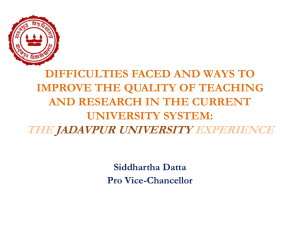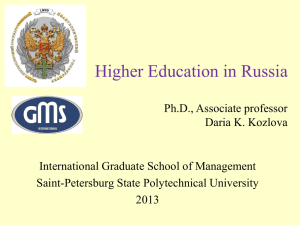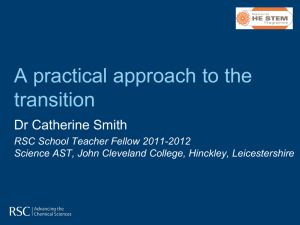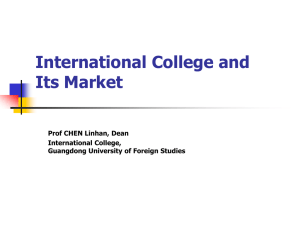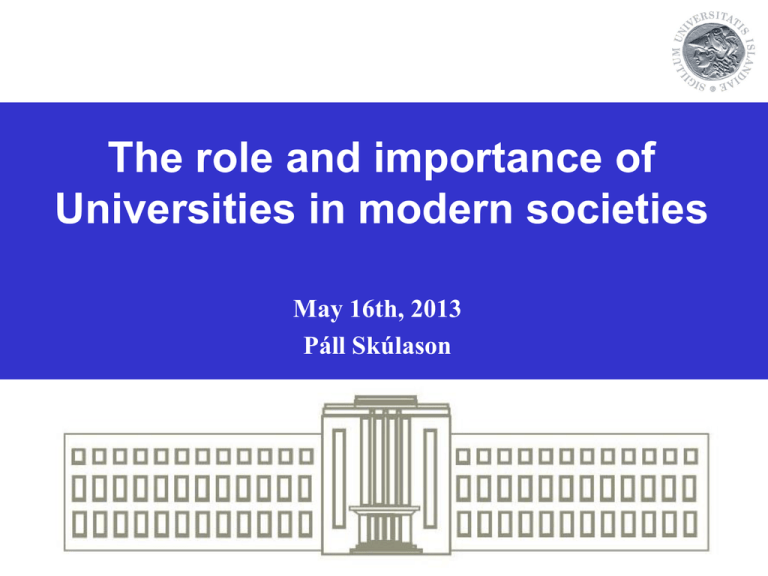
The role and importance of
Universities in modern societies
May 16th, 2013
Páll Skúlason
Academic Globalisation and
Economic Globalisation
Globalisation of knowledge (ideas,
thoughts and theories, and perhaps
visions) – Universities
Globalisation of things and
phenomena which can be bought with
money - Banks
Who are we, human beings?
We are thinking, self-conscious individuals
We are Scandinavians, Chinese, American
...
We are members of the human species
Problems of Life – Different Values
To live with oneself: What is true and
right, good and beautiful?
To organize our common life: What
should be forbidden?
Economic tasks: What is possible?
Three Areas of Life - Problems
Internal life: self-knowledge and selfacceptance: Humanities, Art, and
Literature
Social life: attitude to family, strangers,
friends, sex, authority, violence: Politics,
Morality and Law
Physical life: satisfaction of various
physiological needs, health, shelter, and
protection: Science and Technology
Why Universities Have Survived
We are self-conscious, thinking beings:
Ideas, beliefs, reasons and views are the
raw materials out of which our existence
as thinking beings is made.
The university is the only institution that,
through the centuries, has focused upon
this basic fact of human existence.
Basic Institutions
Universities: Globalization of knowledge
(ideas, concepts, theories)
Nation-states – international institutions
and international associations:
Globalization of political virtues and vices
Banks: Globalization of many of the things
that may be bought and sold.
The responsibility of universities,
nation-states and banks
Universities bear responsibility for
ideas and knowledge
Nation-states bear responsibility for
the functioning of society
Banks bear responsibility for money
and financial assets
The Role of Universities
Teaching: students come with a suitable
educational background and develop this in
the course of their studies
Research: teachers and students work
together toward the growth of knowldge
and learning
Conservation: the preservation of
knowledge and of good practices in
research and scholarship – certify
scientific, scholarly and professional
competence
Role of Banks
Deposits and loans: accept deposits and
lend money to support the projects of
individuals and buisnesses
Investment: increase the wealth of
customers and of the bank
Conservation: preserve the value of
financial holdings – certify currencies and
financial instruments
Types of universities and banks
Teaching universities
Research universities
Commercial banks
Investment banks
Background to the financial bubble
Emphasis on the value of money, aquisition
of money for the sake of becoming rich
Investment services become the principal
function of the banks
Bankers gain control not only of finance but
of politics and culture
. . . continued
Gambling with money, bonds, stocks and
financial instruments that were supposedly
backed by assets
The banking system began to serve its own
interests rather than the interests of the
wider economy
It later emerged that the value of the banks
and their assets were fantastically
overvalued
Background to the university bubble
Unrestrained quest for university degrees
supposedly providing entry to highly paid jobs and
professions
Research of whatever kind considered valuable
and desirable
Steady increase in unemployed university
graduates
Huge output of scientific and scholarly writings
Questions concerning the university
bubble
Are science and scholarship within the university
concerned more with perpetuating themselves than
with producing fertile ideas that might change and
improve our understanding and control of the world?
Is the proliferation of theories, experiments, journal
articles and “results” a sign of a deepened
understanding of reality – or merely of “production”?
Are universities producing graduates capable of
running our societies and solving the life-problems that
we face?
Questions and answers
What can we do to deflate the university
bubble?
Universities must systematically consider
their moral foundations and carry out their
educational mission with those foundations
in mind
Magna Charta Universitatum
900th anniversary of the University of
Bologna 18 September 1988
Declaration of a common policy and moral
foundations of the universities
Over 800 universities have signed this
declaration
Declaration in Three Parts
I. The principal mission of the university
II. The principles of university operations
III. Modes and conditions for the work of
the universities
I. Roles and tasks ...
Universities are called upon to serve
mankind, because the future depends upon
the progress of culture, science and
technology, and the most important
fountain of this progress is the universities
. . . continued
The contemporary university must mediate
knowledge not only to the current younger
generation but to society as a whole, because
the cultural, social and economic future of
society requires the on-going education of the
public.
The universities must educate future
generations to respect nature and life itself.
Faith in knowledge
The knowledge that universities create,
preserve, and transmit secures the future welfare
of society and respect for life on earth.
Knowledge itself is viewed as a basic good that
the universities are entrusted to develop and to
help to apply to the welfare of all mankind.
Is such faith warranted?
Theoretical:
truth, coherence, understanding
Technical:
efficiency, reliability, effectiveness
Ethical
justice, solidarity, freedom
Question: Which of these is the most
important?
II. The Principles...
The first principle is that universities must be
morally and intellectually independent of all
political authority and economic power.
The second principle is that teaching and
research in universities are inseparable.
... continued
The third principle: teachers and students are totally
free to study, learn and pursue knowledge in the way
they choose according to rules of critical thinking.
The fourth principle: a university is the trustee of the
European humanist tradition; its constant aim is to
attain universal knowledge; to fulfil its vocation, it
transcends geographic and political boundaries, and
affirms the vital need for different cultures to know and
influence each other.
III. Modes and conditions for the work of the
universities
Appropriate instruments for teaching and research
must be available
Recruitment of teachers must obey the principle that
research is inseparable from teaching
Students acquire the culture and training for which
they undertake university studies
Universities regard the mutual exchange of
information and documentation, and joint projects,
essential to the progress of knowledge
The Main Virtue of Universities
Academic people must work together and
learn from each other
Therefore, as in the earliest years of their
history, the universities encourage mobility
and cooperation leading to a world-wide
framework for the certification of scientific,
scholarly and professional competence
The Magna Charta calls for . . .
. . . systemic instruction concerning the
duties and functions of universities, their
autonomy and academic freedom, the
relations between teaching and
research, and the humanist tradition
that they are entrusted to develop and
transmit to future generations.
Humanist education in three parts
The first part:
To understand those economic, political
and cultural forces that are at work in
our social reality and influence the
development of science and
scholarship.
Humanist education – part two
The second part:
Training in critical thought, not only
within specific disciplines, but to
analyze, interpret and evaluate
information and inputs of all kinds from
the larger society and from disciplines
beyond one’s own.
Humanist education – part three
The third part:
In all of the work of the university,
attention must be paid to the ethical
goals of all of the academic disciplines.
Question
Do Nordic universities work in the spirit
of the Magna Charta declaration?
Thank you for your attention!!






